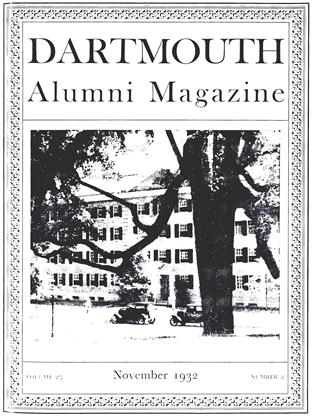By James Thayer Gerould '95, Librarianof Princeton University. Charles Scribners Sons.
Last Commencement Dartmouth conferred on the author of this book the degree Litt.D., in recognition of his outstanding success in university library administration, and his scholarly activities. He was asked by the Carnegie Corporation to write it in order that there might be available to those who have to plan new college library buildings a guide to the best practice. No better choice of author could have been made. Gerould has not only stated accepted practice in planning and construction; he has so lucidly and cogently given the underlying educational and administrative reasons that the book should be read by anyone who needs to know the place of the College Library in college work and the principles of its administration.
The author says "There is general agreement that no library building in the country, large or small, is better adapted to its task—certainly none is more flexible in design—than that at Dartmouth College." This, if true, is due in part to the fact that we had the benefit of his advice. Also the statement should make it obvious that the present reviewer, who had something to do with planning that library, is not likely to disagree with his conclusions. Of course there are one or two minor points upon which we never did and apparently never shall agree. He disapproves of alcoves in College Library reading rooms, while we used them extensively and have not regretted it.
The book does more than give "the latest developments." It interprets the apparent trend of educational movement, and in its advice looks well into the future, but no so far as to be merely visionary. Altogether it is an exceptionally able piece of work. If anyone asks why the library is considered so important a part of a college, this is the book to give him.
 View Full Issue
View Full Issue
More From This Issue
-
 Article
ArticleTHE PERSONALITY OF WEBSTER
November 1932 By Claude M. Fuess -
 Article
ArticleHANOVER BROWSING
November 1932 By Rees Higgs Bowen -
 Sports
SportsTHIS GAME OF FOOTBALL
November 1932 By Edwin B. Dooley -
 Article
ArticleEditorial Comment on the Opening Address
November 1932 -
 Article
ArticleTHE CLASS OF 1936
November 1932 By E. Gordon Bill -
 Class Notes
Class NotesClass of 1930
November 1932 By Albert I. Dickerson
Books
-
 Books
BooksBETTER MANAGEMENT OF BUSINESS GIVING.
NOVEMBER 1966 By ADDISON L. WINSHIP II '42 -
 Books
BooksMore and Merrier
April 1980 By Chas Carner '74 -
 Books
BooksAFTER CARS CRASH: THE NEED FOR LEGAL AND INSURANCE REFORM.
DECEMBER 1967 By MICHAEL L. SLIVE '62 -
 Books
BooksAMERICA'S VIETNAM POLICY: THE STRATEGY OF DECEPTION.
APRIL 1967 By PAUL LEARY -
 Books
BooksFLIGHT IN WINTER,
April 1942 By Wayne E. Stevens -
 Books
Books"The Survival Value of Christianity"
June, 1926 By William Kilborne Stewart


